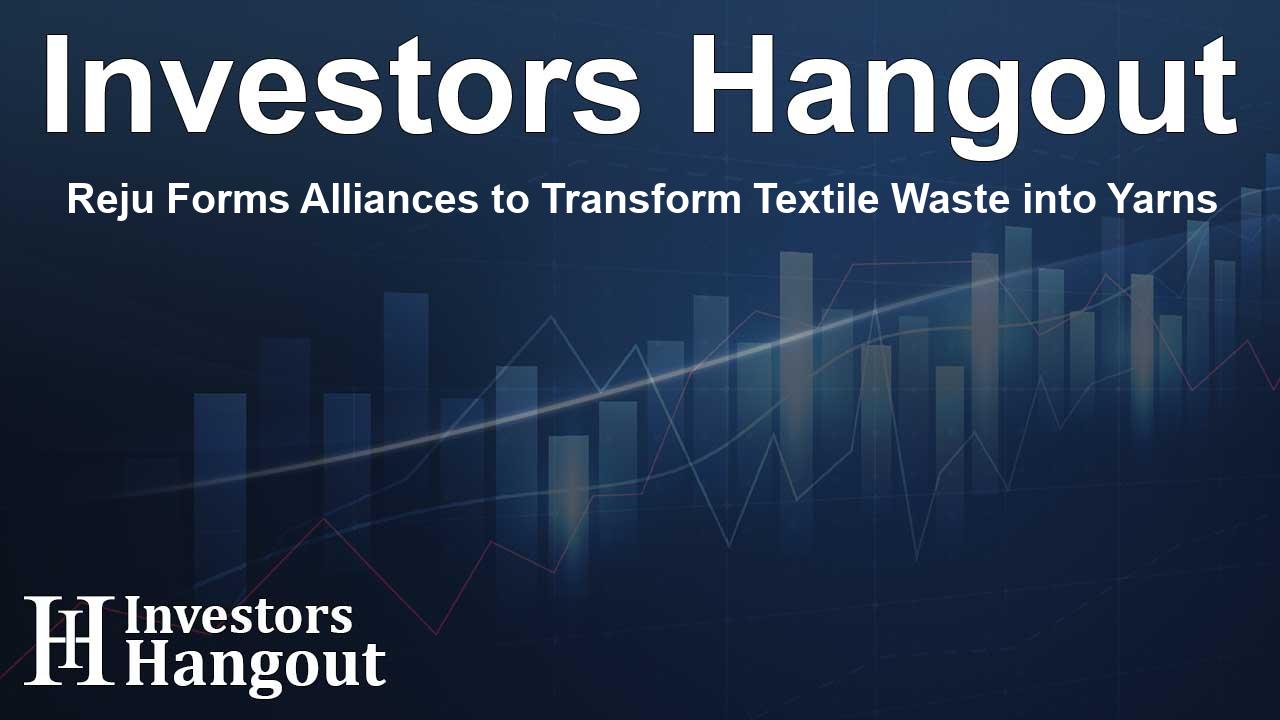Reju Forms Alliances to Transform Textile Waste into Yarns

Reju Forges New Partnerships for Sustainable Textile Solutions
Reju™, a trailblazer in textile regeneration, has recently established strategic partnerships with Utexa and Antex, renowned manufacturers in filament yarn production. These partnerships mark a significant step towards utilizing Reju’s innovative REJU Polyester™ material in the development of sustainable fabrics. With Utexa’s base in Central America and Antex in Europe, the collaboration aims to significantly enhance the textile industry.
Innovative Beginnings with REJU Polyester™
In collaboration with Utexa and Antex, Reju is spearheading the adoption of REJU Polyester™ for textile applications. The material promises to reshape manufacturing practices by focusing on recycling and sustainability. These partners will work on validating the quality and commercial viability of REJU Polyester™, ensuring it meets the demands of modern textile applications. By October 2025, products produced by Utexa and Antex using this innovative material will be available for garment development.
Addressing Global Textile Waste Challenges
Reju's partnerships aim not only to foster innovation but also to tackle the growing issue of post-consumer textile waste. This initiative is vital as the world grapples with the environmental repercussions of textile disposal. By creating a circular textile economy, Reju, Utexa, and Antex are paving the way for comprehensive recycling solutions and ensuring responsible production in the textile sector.
Building a Circular Textile System
The combined efforts of these companies aim to develop advanced sorting and preparation infrastructures necessary for recycling textiles. Through these collaborations, a robust foundation will be established for implementing Extended Producer Responsibility (EPR) schemes in various regions, enabling companies to take greater accountability for their products throughout the lifecycle.
CEO Insights on Sustainable Practices
Patrik Frisk, CEO of Reju, shared his enthusiasm about the partnerships, stating, "These collaborations speed up the production of high-quality, sustainable yarns needed as consumers increasingly seek environmentally friendly options. By working alongside Utexa and Antex, we can exhibit our ability to generate top-notch yarns in regions where we establish our Regeneration Hubs." This alignment with sustainability not only meets consumer expectations but also champions a responsible approach to textile manufacturing.
Benefits of REJU Polyester™
Reju Polyester™ brings several advantages that appeal to both manufacturers and consumers:
- Lower Carbon Emissions: Reju’s regeneration process claims a reduced carbon footprint, offering a significant reduction in emissions compared to traditional virgin polyester.
- High-Quality Regenerated Material: The technology behind Reju ensures that the produced polyester is free from contaminants and thermal degradation, standing out for its quality in textile applications.
- Stable Supply Chain: By addressing local waste issues and fostering partnerships within regions, Reju promotes a resilient supply chain that enhances flexibility and speeds up product delivery to markets.
Looking Ahead with Partnerships
Jon Pavlansky, President of Utexa, expressed his commitment to innovation, stating, "Working with Reju showcases our dedication to advancing textile innovation in the Americas. We eagerly anticipate harnessing the power of REJU Polyester™ to set new benchmarks in sustainability within the industry." Likewise, Marta Molist, from Antex, echoed this sentiment, emphasizing their pride in using this innovative material to fulfill environmental and performance needs on a large scale.
Future Developments
As these partnerships progress, updates on pilot programs and outcomes will be shared. Reju aims to keep stakeholders informed about the advancements made in this initiative and its impact on sustainability within the textile sector.
Frequently Asked Questions
What is the significance of the partnerships announced by Reju?
The partnerships with Utexa and Antex aim to utilize REJU Polyester™ in sustainable fabric production, significantly addressing textiles' environmental impact.
What are the benefits of using REJU Polyester™?
REJU Polyester™ offers lower carbon emissions, high-quality regeneration, and a stable supply chain, making it an attractive option for sustainable textile production.
How does Reju plan to tackle textile waste?
Through its partnerships, Reju is committed to developing a circular textile economy that emphasizes recycling and responsible production practices.
What does Reju’s CEO say about their mission?
CEO Patrik Frisk highlights the importance of these collaborations in meeting consumer expectations for sustainable products and fostering regional textile innovations.
When can we expect updates on the partnerships?
Reju plans to share updates on the progress of pilot programs in the coming months to keep stakeholders informed of any advancements.
About The Author
Contact Logan Wright privately here. Or send an email with ATTN: Logan Wright as the subject to contact@investorshangout.com.
About Investors Hangout
Investors Hangout is a leading online stock forum for financial discussion and learning, offering a wide range of free tools and resources. It draws in traders of all levels, who exchange market knowledge, investigate trading tactics, and keep an eye on industry developments in real time. Featuring financial articles, stock message boards, quotes, charts, company profiles, and live news updates. Through cooperative learning and a wealth of informational resources, it helps users from novices creating their first portfolios to experts honing their techniques. Join Investors Hangout today: https://investorshangout.com/
The content of this article is based on factual, publicly available information and does not represent legal, financial, or investment advice. Investors Hangout does not offer financial advice, and the author is not a licensed financial advisor. Consult a qualified advisor before making any financial or investment decisions based on this article. This article should not be considered advice to purchase, sell, or hold any securities or other investments. If any of the material provided here is inaccurate, please contact us for corrections.
